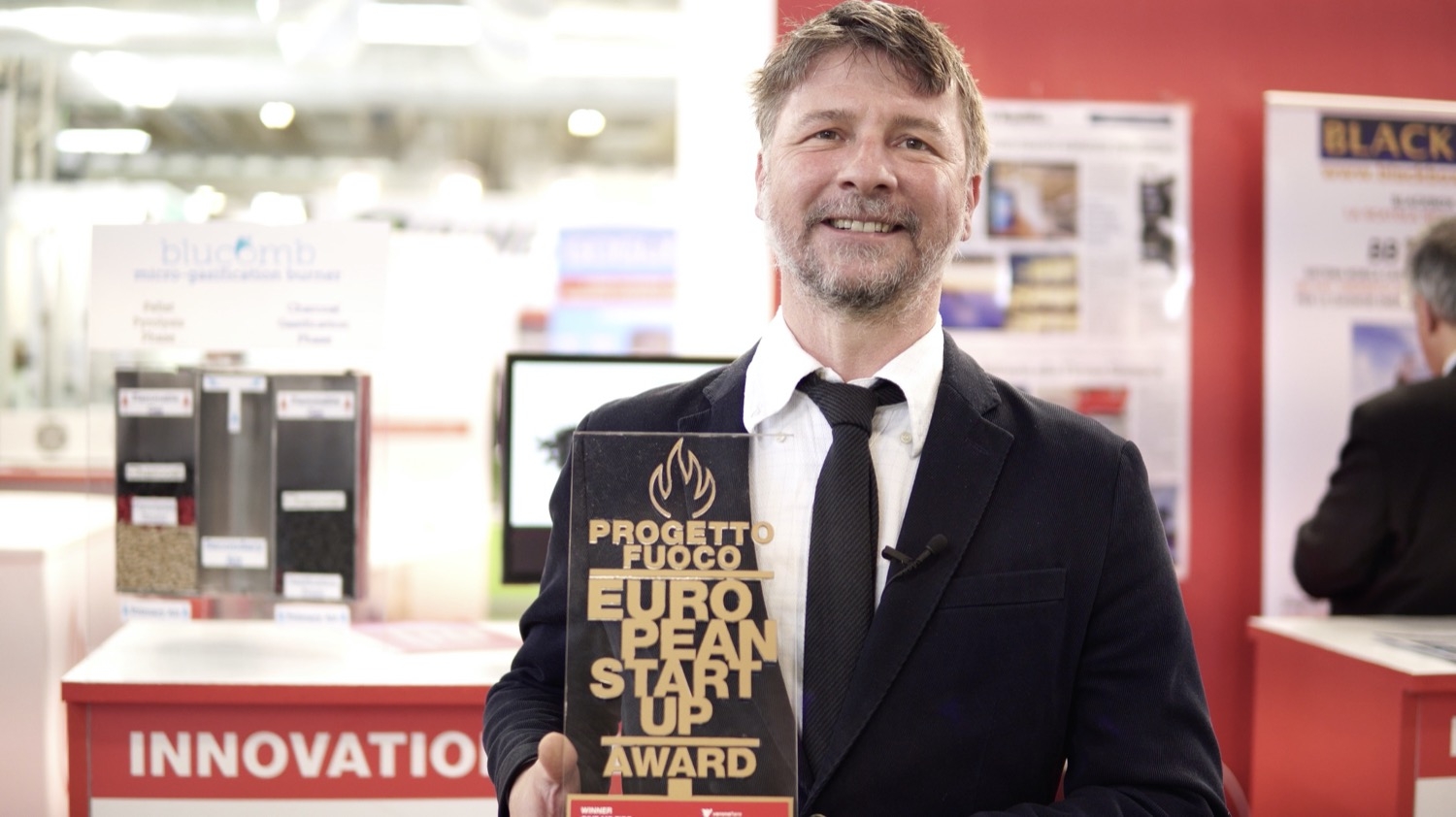THE LOW EMISSION PELLET STOVE WHICH OPTIMISES BLUCOMB CARBON, A PROJECT CREATED FOR AFRICAN VILLAGES WINS THE PROGETTO FUOCO GIVE ME FIRE AWARD
The curtain comes down on the first edition of the contest dedicated to innovation in the wood and biomass sector, promoted by Progetto Fuoco and Blum in association with AIEL. The public prize is awarded to Belgian brand Sûti Design & Utility, which designs and produces attractive and technologically advanced heating systems. Innovation in the fire sector has a new rising star: Blucomb of Udine, the startup that has just won the first edition of Give Me Fire – Progetto Fuoco European Startup Award, the international prize dedicated to innovation in the sectors of heating and energy produced from wood and biomass, promoted by Progetto Fuoco and Blum, in association with Aiel – the Italian Association of Agroforestal Energy.
What is Blucomb
Blucomb is a micro-gasification burner for pellet stoves which guarantees high efficiency and low emissions. How? By dividing the combustion in two parts: first it transforms the fuel into carbon and gas, and only subsequently does it burn them, all without needing to use energy. This is a story which has its roots in the laboratories of the University of Udine, from which Blucomb was created as a spin-off in 2012: for a project with Professor Alessandro Peressotti, improved culinary stoves were created to cook food in developing countries, an invention from which the current burner was created. In the field of international projects, Blucomb teaches the local population in several African countries (Ghana, Togo, Sierra Leone, Cameroon, Burundi, Zimbabwe, Ethiopia) how to build the stoves with locally available materials and technology. The verdict was given by the panel of 10 experts, after the final which took place at the 12th edition of Progetto Fuoco at Fiera di Verona. The panel chose the best of the 12 innovative companies which had been selected from an international contest and then hosted at the first Give Me Fire Innovation Village at Pavillion 9.
Why Blucomb is different
“Our patent consists of a reaction chamber which regulates the combustion reactions” says physicist Carlo Ferrato, co-founder of Blucomb. “We divide the combustion into two phases: first we transform the pellets into carbon and combustible gas, and in the second phase we transform the carbon into combustible gas and ashes. This allows us to produce inflammable gas which is then mixed with air to obtain a much cleaner combustion than with traditional pellet stoves, which don’t differentiate between phases and burn everything together. Another difference between traditional stoves and Blucomb is that Blucomb works without electrical current. We started off at the University of Udine: with professor Alessandro Peressotti from the Agrarian Studies faculty we created improved culinary stoves for the cooking of food in developing countries. We then adapted that technology to domestic stoves and small boilers. All our burners allow the user to burn while optimising emissions, and can be applied to traditional stoves, making them more efficient, thanks to the adaptability in terms of the length and power of the combustion”.

A first edition that kept its promises
“The first edition of Give Me Fire kept its promises” commented Raul Barbieri, general manager of Piemmeti, the company owned by Veronafiere that organises Progetto Fuoco, who continued: “by showing a sector in which companies compete increasingly in terms of product innovation, from the search for reduced emissions and increased performance, to a concept of design in line with contemporary trends”. “It was a great challenge” added Luca Barbieri from Blum, who continued: “which started with intense scouting, and was carried on through the schedule of the Give Me Fire Innovation Village during Progetto Fuoco. Even those who didn’t win anything can take something away from the experience: contacts with potential clients and industrial partners which could turn out to be precious, as could the exchanging of ideas with experts and fellow startuppers”.
Public prize and podium
The public prize, awarded by visitors to the stands, was awarded to Sûti Design & Utility, a brand of pellet stoves characterised by their unique design and high technology, created by the Belgian company Distri & Design.
Of the 12 startups in the contest, the panel selected three semi-finalists. As well as Blucomb, the following startups were awarded a place on the podium: Pyro & Tech – a startup from Villa di Tirano (Sondrio), which created the Hybrid system which combines the advantages of a micro-cogenerator with those of a biomass boiler, and Black Box Green – a startup from Fiorano Modenese (Modena), which offers a cloud- operated monitoring, analysis and control system for optimal energy efficiency in biomass combustion or gasification systems.

Blucomb – profile of the winning startup
Blucomb of Udine designs and produces patented pyrolytic pellet burners which do not require electronic controls, moving mechanical parts, or electrical current. Blucomb develops pyrolytic applications for stoves and boilers based on the needs and instructions provided by the client. For clients, mostly companies producing domestic heating appliances, the burners are installed in models already in production and are tested for efficiency and emissions to ensure they are ready for product certifications which currently require ever higher standards. In the laboratory, equipped with all the necessary tools for combustion analysis (CO, fine particles, NOx), the efficiency and modality of heat transfer into the environment are measured, new products based on pyrolysis are developed, and refresher courses are held for artisan heating engineers who want to take advantage of this new technology for their business. Investment in research and development is of primary importance and is also supported by consultancy work at the University of Udine and other international bodies that deal with capacity building and know-how transfer concerning appliances for water sanitisation and the cooking of food in developing countries.








